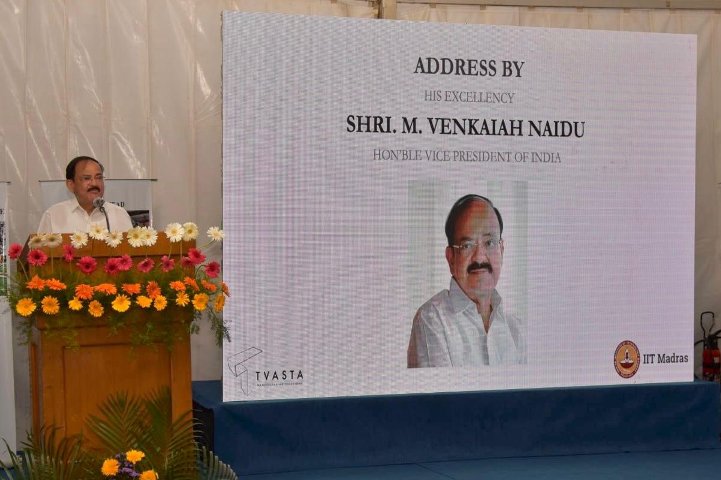VP Naidu commends IIT Madras's efforts behind project of 3D Printed House
Earlier, Shri Naidu commended the efforts of the team behind the project of India’s first 3D Printed House- a joint collaboration of IIT Madras and a startup, Tvasta Manufacturing Solutions.

- Country:
- India
The Vice President of India, Shri M Venkaiah Naidu today called upon the research community and institutions like IITs to come up with intelligent solutions to thwart the sinister plans of terrorists to hurt the country’s interests.
Speaking after visiting the site of India’s first 3D Printed House in India at IIT Madras, the Vice President observed that terrorism is the enemy of mankind and referred to the use of low-flying drones by terrorists and pointed that they cannot be detected military radars.
He advised institutions like IITs to also focus on areas related to terrorism and come up with solutions to counter the efforts of terrorists.
Earlier, Shri Naidu commended the efforts of the team behind the project of India’s first 3D Printed House- a joint collaboration of IIT Madras and a startup, Tvasta Manufacturing Solutions.
Emphasizing the developmental prerogatives of technology, the Vice President highlighted the importance of ‘industry-institute partnerships in scaling up emerging technologies and achieving commercial viability.
Observing that cutting edge technologies provide a glimpse into the future, Shri Naidu stressed the importance of scaling them up so that they are accessible to the common man. ‘Technologies should not be limited to being only ‘proof of concept’. It can greatly alleviate human suffering and make a common man’s life comfortable. That is the ultimate purpose of any research, he added.
Shri Naidu said the project showed the possible benefits of the fourth industrial revolution, where a fusion of smart technologies like 3D printing and robotics has the potential to change traditional manufacturing practices.
Noting the advantages of the technology, the Vice President said that 3D printing in construction offers a completely customizable house design and reduces manual intervention. He called for more such technological innovations to address the housing shortage in India and to fulfil the ambitious low-cost housing projects like the Pradhan Mantri Awas Yojana (PMAY).
Speaking on higher education, Shri Naidu suggested that premier institutes like IITs are best placed to foresee the upcoming technological revolutions and keep the country better prepared in seizing new opportunities. He also advised higher education institutes to go beyond classroom programmes and prepare students for real-world challenges by inculcating a holistic approach to problem-solving. “This way, they will become our job creators and not just job seekers”, he said.
Shri Naidu stressed the need for IITs to identify the focus areas for technological intervention in our country, keeping in view the national priorities and local relevance. By putting the best minds on the socially relevant research problems, IITs would be able to fulfil their mandate and purpose, he added.
The Vice President also commended IIT Madras for encouraging innovation and for nurturing a vibrant startup ecosystem through its state-of-the-art research park. He also complimented the team from Tvasta Manufacturing Solutions and noted that Indian startups are diversifying beyond IT solutions and making their mark in agri-tech, manufacturing, transport and construction.
Tamil Nadu Revenue Minister, Thiru S Ramachandran, IIT Madras Director, Dr Bhaskar Ramamurthi, Deans and Heads of Departments, and representatives of Tvasta Manufacturing Solutions were present.
(With Inputs from PIB)










